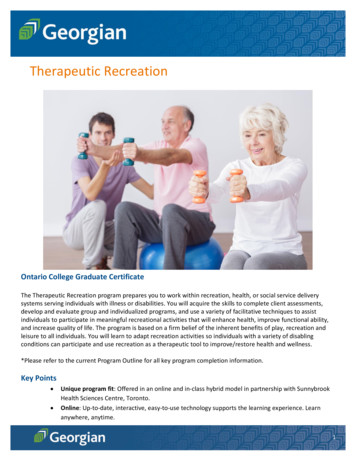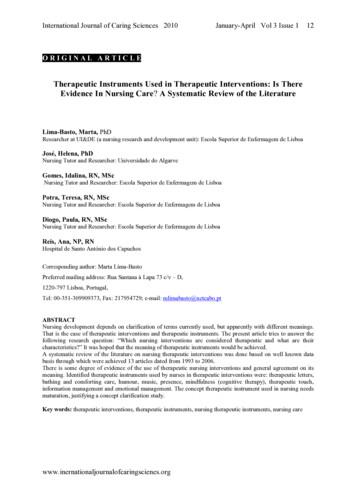Professional Issues In Therapeutic Recreation-PDF Free Download
Therapeutic Recreation (9 - 15 hours) CTR 633 - Professional Issues in Therapeutic Recreation (3) CTR 634 - Advanced Procedures in Therapeutic Recreation (3) CTR 637 - Advanced Interventions and Facilitation Techniques in Therapeutic Recreation (3) CTR 638 - Advanced Client Assessment in Therapeutic Recreation (3)
Therapeutic Recreation Program Undergraduate Handbook Page 2 of 18 2010-2011 Therapeutic Recreation at Temple University Therapeutic Recreation (TR) is an established discipline in health care and human services. The undergraduate curriculum in TR, which allows students to study to become recreation therapists,
The Master of Science in Therapeutic Recreation Program prepares students for certification as Therapeutic Recreation Specialists. Students learn to develop and implement treatment, leisure education, and recreation programs for individuals with special needs. Graduates are prepared to: Assess the need for therapeutic recreation intervention
TREC 1008 Professional Issues and Trends 42 TREC 1003 Summer TREC 1009 Organizational Leadership: Therapeutic Recreation 42 n/a Summer TREC 1010 Facilitative Techniques in Therapeutic Recreation 42 TREC 1002, & 1003 Fall TREC 1011 Research in Therapeutic Recreation 42 TREC 1003 Winter
Processes and techniques in Therapeutic Recreation: Theoretical and practical aspects of the procedures necessary for assessment, planning, implementation, management, and evaluation specific to therapeutic recreation services. Facilitation in Therapeutic Recreation: Various hands on and applicable facilitation techniques.
AIII.1 The following revisions are proposed for the Therapeutic Recreation, B.S. Name of Program and Degree Award: Therapeutic Recreation, B.S. Hegis Number: 2199 . Program Code: 34565 . . REC 425 Processes and Techniques of Therapeutic Recreation 3 . 9 credits in Recreation Internship: REC 370 Recreation Internship 4
Therapeutic Recreation Administration (Courses required in addition to Core) Emphasis (9 hours): REC 524-3 Professional Skills in Therapeutic Recreation REC 526-3 Seminar in Current Issues in Therapeutic Recreation REHB 470-3 Rehabilitation Administration OR REHB 573-3 Programming, Budgeting, and Community Resources OR
There is some degree of evidence of the use of therapeutic nursing interventions and general agreement on its meaning. Identified therapeutic instruments used by nurses in therapeutic interventions were: therapeutic letters, bathing and comforting care, humour, music, presence, mindfulness (cognitive therapy), therapeutic touch, .
Q14 RCLS 420 PROG PLAN/EVAL THERAPEUTIC REC (4 cr.) F17, W18, Sp18, Su18 Prerequisites: declared Therapeutic Recreation major or permission of instructor. Q14 RCLS 440 PROFESSIONAL ISSUES IN TR (4 cr.) F17, W18, Sp18, Su18 Prerequisites: d eclared Therapeutic Recreation Major or permission of instructor.
The promise of the internship in the moral development of therapeutic recreation students: A research-based case report. ATRA Annual in Therapeutic Recreation, 22, 1-23. Wilder, A., Craig, P. J., & Frye, M. S. (2014). Therapeutic recreation empowering kids (TREK): Exploring best practices in transition. American Journal of Recreation Therapy,13(2),
Ethical Issues in Therapeutic Recreation Introduction The process of recreational therapy will always call for some ethical-decision making processes due to the nature of the tasks involved. Therapeutic recreation can be viewed as the process of providing various treatment services to clients with various ailments, be they physical
Services; Client Outcomes in Therapeutic Recreation Services; and Professional Issues in Therapeutic Recreation Services: On Competence and Outcomes, among others. She has conducted over 400 presentations at the local, state, national, and international levels, on a variety of topics, including client outcomes, evidence-based practice,
KEY WORDS: Therapeutic Recreation, Gender, Equity, Work Attitudes Article: While a few studies in the field of therapeutic recreation (TR) have addressed professional issues such as burnout, personality types, salaries, and inequities between TR and other health care disciplines (Bedini,
The Standards of Practice for Recreation Therapists and Recreation Therapy Assistants are designed to serve as a foundation for the practice of therapeutic recreation regardless of setting. This document has been created using the original Standards of Practice for Therapeutic Recreation(TRO, 2003) document as a foundation.
Dr. Lynn Anderson is a Distinguished Service Professor in the Recreation, Parks and Leisure Studies Department at State University of New York at Cortland, and the director for the Inclusive Recreation Resource Center. She has been active in the field of therapeutic recreation, inclusion, and outdoor recreation for over 35 years, and has won
Therapeutic Recreation Professional Development Practice the guidelines and policies as stated in therapeutic recreation literature and documentation. Provide intervention that incorporates and embrace the theories, practices and . appear to be at high risk, or issues are arising that recreation therapists are not trained to manage.
Part II. Leisure and Recreation as a Multifaceted Delivery System Leisure Service Delivery Systems Parks and Protected Areas in Canada and the United States Public Recreation Nonprofit Sector For-Profit Sector: Recreation, Event, and Tourism Enterprises Therapeutic Recreation Unique Groups Leisure and Recreation Across the Life
Foundation concepts of therapeutic recreation including history, social issues, professional issues, and basic program design. Prerequisites: HSC 105; KNR 181 or 182. KNR 271 or consent of instructor. Introductory course on the background, job functions, program design, and professional issues within the discipline of therapeutic recreation.
& Christopher, 2011, p. 2). To meet the needs of today’s therapeutic recreation students, a textbook using case studies is needed to guide the student toward informed decisions of care. Case Studies in Therapeutic Recreation focuses on problem-based learning using
1990 M.S., Recreation and Parks; Emphasis in Therapeutic Recreation The Pennsylvania State University Thesis: The Experience of Self in Alcoholics Anonymous: Implications to Leisure, Dr. John Dattilo, advisor. 1986 B.S., Recreation and Parks; Emphasis in Therapeutic Recreation The Pennsylvania State University EMPLOYMENT RECORD: July 2017-
Recreation, Parks and Leisure Studies Department at State University of New York at Cortland, and the director for the Inclusive Recreation Resource Center. She has been active in the field of therapeutic recreation, inclusion, and outdoor recreation for over 40 years. Dr. Lauren Liebermann, is currently a Distinguished Service
Faculty in the Department of Recreation Management and Therapeutic Recreation are expected to serve the institution and their profession. This service can take the form of participating on departmental and university committees, offering professional assistance to off-campus groups,
the purpose and content of quality assurance and improvement in therapeutic recreation. Required tasks: Theory paper and Program Plan. Note: This class is specific to Therapeutic Recreation students. KNR 298.30 Junior level 90 hour internship Syllabus learning outcomes: Participate in 90 hours of professional practice in
Define Therapeutic Alliance. Explain Self-Determination Theory using the 5-A framework and how it can improve therapeutic alliance. Evaluate patient situations and apply communication techniques which can facilitate improved therapeutic alliance. Analyze evidence that demonstrates a stronger Therapeutic Alliance
program development. Their clear presentation of topics related to both comprehensive and specific program planning enables the therapeutic recreation or recreation therapy student to gain both knowledge and skills in these areas. Once more, we have a compre
recreation assessment waters. This book intends to add to those efforts and to improve the competence of new and continuing professionals in therapeutic recreation assessment. It aims to solidify in the reader’s mind the relationship between i
Fall 2015 REC 604- Foundations of Therapeutic Recreation Guest Lecturer via Webinar (graduate level): Therapeutic Recreation and Youth Development, October 7, 2015 Recreation, Parks and Leisure Studies Department at SUNY Cortland, NY Spring 2011 SES 616-Research Methodology in Sport and Exercise Science
professional docu ments were analyzed in relation to the 7.0 series of COAPRT Learning O utcomes, and used to . The Task Force identified four accreditation issues: (a) the need to simplify the process, (b) focus on . in therapeutic recreation/recreation therapy education that is reflective of the entire profession. T he gap
New Recreation Program or Service Evaluation Form 28 . 3 Naperville Park District Recreation Programming Plan Updated Feb. 25, 2016 RECREATION PROGRAMMING PLAN PLAN OVERVIEW The Recreation Programming Plan includes all elements and services of the District’s programming functions, inc
Recreation Department Personnel 16 Mission, Goals and Objectives 17 Collaborative Partnerships 19 Comprehensive Review of the Recreation Programming Plan 20 Appendix A: New Recreation Program or Service Review Procedure 22 New Recreation Program or Service Request Form 26 New Recr
Town of Dryden Recreation Commission (2006) —SUNY Cortland, Department of Parks, Recreation and Leisure Studies This study was used to assist the newly formed Dryden Recreation Commission to gauge the needs, preferences, and beha-viors of the community it serves. Traditionally, the Town's recreation programs have been
Odessa, FL 33556 Mango Recreation Center (map) 11717 Clay Pit Road Seffner, FL 33584 Northdale Park & Recreation Center (map) 15550 Spring Pine Drive Tampa, FL 33624 Roy Haynes Park & Recreation 6 Center (map) 1902 South Village Ave. Tampa, FL 33612 Ruskin Park & Recreation Center (map)
viduals interested in becoming a Certified Therapeutic Recreation Specialist. While NCTRC cannot warrant an individual’s abilities in professional practice, certification will help identify the individual who possesses the entry-leve; necessary knowledge for competent practice in therapeutic recreation.
Recreation, Parks and Leisure Studies Department at SUNY Cortland. For the past 35 years, she has written, taught, conducted research and delivered professional presentations and workshops in the areas of strengths-based practice, inclusion, and therapeutic outdoor adventures. She serves as an editor for the Therapeutic
Professional and therapeutic communication focuses on all aspects of interpersonal interaction that are essential to safe, high-quality healthcare. The therapeutic nature of engagement with patients, clients and consumers of healthcare cannot be detached from the professional elements of communication. .
CLIENT FACTORS, THERAPEUTIC ALLIANCE, AND TRAUMA 6 the dominant behavioural coping strategies of clients could be highly salient factors in the therapeutic alliance of clients with PTSD (Ackerman & Hilsenroth, 2003; Black, Curran, & Dyer, 2013). The effect of client attachment style on the therapeutic alliance has a strong research base.
Elements of different therapeutic approaches should be drawn on, in an integrated model which enables practitioners to respond to those individual needs and preferences. Establishing a strong therapeutic alliance with the child is vital. The involvement of a non-abusing parent in the therapeutic process should be considered as a potentially
Therapeutic proteins are increasingly prominent because they have proven to be effective in treating many potentially . production of therapeutic proteins, pharmacokinetics of therapeutic proteins, immunogenicity
Immunogenicity and Therapeutic Efficacy of a Dual-Component Genetic Cancer Vaccine Cotargeting Carcinoembryonic Antigen . Thus, these proteins are suitable for therapeutic vaccination to induce long-lasting cytotoxic T and B cell responses that may exert therapeutic effe
Therapeutic Interventions for CSEC Survivors . Therapeutic Models . Therapeutic treatment models should provide the framework for a therapist to formulate a relationship with a . client. However, this three-phase therapy model focuses less on the biology and more on the acquisition and prac







































